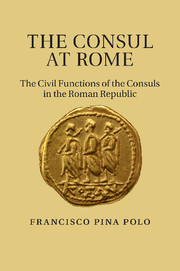Book contents
- Frontmatter
- Contents
- List of illustrations
- Acknowledgements
- Introduction
- PART I THE CONSULAR FUNCTIONS IN THE PRE-SULLAN AGE (367–81)
- PART II THE CONSULAR FUNCTIONS IN THE POST-SULLAN AGE (80–50)
- 12 The supposed lex Cornelia de provinciis ordinandis and the presence of consuls in Rome in the post-Sullan period
- 13 Consular functions from the year 80 to 50
- 14 The consular year in the post-Sullan period
- 15 Conclusion
- Bibliography
- Index of Subjects
- Index of Ancient Sources
- Index of Ancient Personal Names
14 - The consular year in the post-Sullan period
Published online by Cambridge University Press: 25 October 2011
- Frontmatter
- Contents
- List of illustrations
- Acknowledgements
- Introduction
- PART I THE CONSULAR FUNCTIONS IN THE PRE-SULLAN AGE (367–81)
- PART II THE CONSULAR FUNCTIONS IN THE POST-SULLAN AGE (80–50)
- 12 The supposed lex Cornelia de provinciis ordinandis and the presence of consuls in Rome in the post-Sullan period
- 13 Consular functions from the year 80 to 50
- 14 The consular year in the post-Sullan period
- 15 Conclusion
- Bibliography
- Index of Subjects
- Index of Ancient Sources
- Index of Ancient Personal Names
Summary
As we have already seen, the list of consular functions from 80 to 50 was long and qualitatively significant: the consuls received foreign embassies and introduced them to the senate; they took an active part in granting honours to individuals who had distinguished themselves by their actions in favour of the Roman state; they concluded or renewed treaties for whose implementation they were ultimately responsible; the consuls' intervention in debates in the senate regarding all sorts of questions was constant, and they promoted a large number of senatorial decrees; they were entrusted with the enactment of the senatus consulta once they had been passed, whether they had sponsored them or not; they legislated on very varied aspects of social life and the economy and politics of the Roman civitas, such as electoral corruption, distribution of public land, the corn supply, the courts, and the tribunician power; they were the representatives of the community before the gods of the Roman civic religion and had to ensure that relations with them were appropriate by conducting acts of expiation, supplications, and the traditional feriae Latinae, over which they had to preside; when necessary, they acted against deities and rituals which were perceived as pernicious, as in the case of the consul Gabinius in 58, who acted against the Egyptian cults; they took part in political debates before the people in contiones which were convened by them or by other magistrates and often had to give their opinion on topical public matters; […]
- Type
- Chapter
- Information
- The Consul at RomeThe Civil Functions of the Consuls in the Roman Republic, pp. 316 - 328Publisher: Cambridge University PressPrint publication year: 2011
- 1
- Cited by



